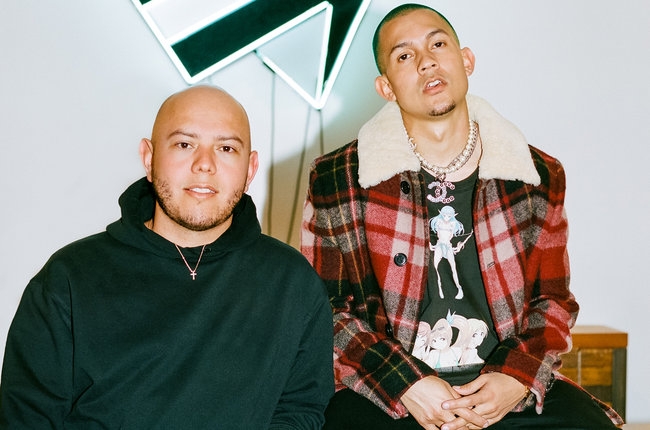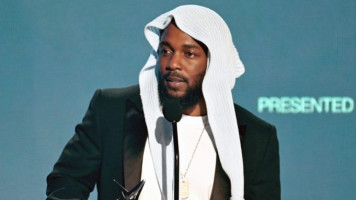Even an abbreviated history of reggaeton would have to include Wisin & Yandel’s 2006 breakthrough “Pam Pam,” Daddy Yankee’s “Impacto” remix with Fergie the following year, pioneering rapper Ivy Queen’s “La Vida Es Así” in 2010 and of course, Cardi B, Bad Bunny and J Balvin’s 2018 blockbuster “I Like It." Those songs trace the autobiography of Marco “Tainy” Masís, the Puerto Rican producer who, at the age of 29, has spent the past decade crafting the foundation of a sound now on the cusp of global explosion.
Over the past year, his influence has only grown. Masís co-produced all but three of the 14 tracks on Balvin’s eclectic Vibras, one of the most creative, infectious albums of 2018. He also worked with Bad Bunny on his boundless debut X100PRE. The inescapable, bilingual monster hit “I Like It,” which climbed to the Hot 100’s summit last summer? That’s Masís on co-production, too. And with a new soon-to-be hit on his hands -- the humming “I Can’t Get Enough,” a collaboration with Selena Gomez, Balvin and Benny Blanco released in February -- he’s teasing the kind of genre-blending sound soon to come on his own debut album.
The song, which Masís made specifically for Gomez, is just the first release from an upcoming mini EP that he’ll release with Benny Blanco, who he initially met over a FaceTime call. Later this summer, Masís will unveil his first-ever album, with all of his friends: Wisin & Yandel, Bad Bunny, Ozuna and Maluma are all confirmed collaborators.
Masís has signed as a recording artist with Roc Nation and will launch his own solo project, with features from Bad Bunny, J Balvin, Ozuna and more, later this year.
“I couldn’t have asked for a better home. To have Lex [Borrero, EVP & Head of Roc Nation Latin] and Ty Ty believe in me and guide me through this next step; it’s a privilege,” said Masís.
Given his flashy resume, one might be surprised by the humble, soft-spoken man who arrives at Billboard’s New York offices on a chilly March afternoon, his buzzcut peeking out from the fur collar of his red-and-black plaid coat. Last month, Masís attended the Grammy Awards for his first-ever nomination (record of the year contender “I Like It”), and he looks back on that night with a mix of pride and bewilderment.
“I felt like a little kid, coming in and watching everybody perform,” he says. “I grew up listening to their music, or am at this moment, and to be a part of that scene right there is crazy.”
In the late 1990s, as the first notes of reggaeton were just beginning to clatter in the underground clubs of San Juan, Masís was a teenager growing up just east of the capital. He was in the right place at the right time. One of his closest friends was Josias de la Cruz, a.k.a. Nely "El Arma Secreta,” a fellow reggaetonero he met through church who would later establish himself as a top producer to the genre’s biggest stars.
One day, when Masís arrived at the studio, Nely was nowhere to be found -- but there was Francisco “Luny” Saldaña, one-half of the now-iconic Latin production duo Luny Tunes. “He told me, 'let me see what you can do,’ so I started creating something from scratch,” Masís remembers. “He heard it and went crazy, and signed me on the same day.” Masís was 15 years old and still in school.
That kind of unrestricted access and off-the-cuff inventiveness was characteristic of the early days of reggaeton, Masís says, when the genre was still a hyper-local trend. Even though artists like Luny Tunes “were the greatest producers at the moment” in Puerto Rico, they weren’t difficult to track down, and their doors were (for the most part) open.
His big break came through another reggaeton duo, Wisin & Yandel, who gave Masís a chance to co-produce parts of their groundbreaking 2005 album Pa’l Mundo.
Suddenly, Masís found himself in reggaeton’s inner circle, with lines to Don Omar, Daddy Yankee, Zion y Lennox and others. Eventually his rolodex led him to J Balvin.
These days, Masís, Balvin, Bunny and others are leading a new crop of reggaeton superstars infusing the genre with trap, pop and rock. Masís helped Balvin create “different textures -- not just an[other] urban album." And for Bunny’s 100XPRE, “we sat down and listened to Limp Bizkit and Blink-182, even some indie stuff -- everything.” The whiplash-inducing beat-switches on tracks like “Solo De Mi” and “La Romana” were Bunny’s idea: “At first, I was like, ‘how am I going to mix these two?’” Masís remembers. But, as he quickly learned, “it doesn’t have to make sense.”
The particulars of “I Like It” in particular are mind-blowing: Here is a fully bilingual collaboration between the Puerto Rican Bunny, Colombian Balvin and Afro-Caribbean Cardi that samples a half-a-century-old boogaloo hit. “At the beginning, if you weren’t from Puerto Rico, you weren’t doing reggaeton,” Masís says. “Now you have different lanes to go to, and not just be in this box. And I think it’s going to keep growing.”
Masís will reflect on his arsenal of hits in Las Vegas next month, as a speaker on BMI’s How I Wrote That Song panel at Billboard’s annual Latin Music Week conference. https://www.billboardevents.com/event/billboard-latin-music-week-2019/#registration
“I try to sit back and look at those things,” he says. “I would never imagine looking at the Hot 100 and seeing a song of ours.”
As for his new Roc Nation deal and his upcoming debut, “I’ve always had it in mind, but it was never the right time -- either I was finishing things for other people, or there was a lot behind-the-scenes,” Masís says. “This is the moment, right now.”





